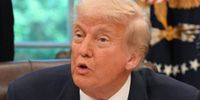In a surprising announcement this week, former President Donald Trump declared two new national holidays, aiming to reshape America's historical narrative surrounding World War I and World War II. However, these proclamations are unlikely to change the daily lives of Americans, as Trump made it clear that the country will not be closing for these holidays.
On May 8, 2025, Americans are set to commemorate the allies’ victory in World War II, a move that Trump believes will finally give the United States the recognition it deserves for its role in the global conflict. "We will not be closing the Country for these two very important Holidays, November 11 and May 8, World War I and World War II, because we already have too many Holidays in America — There are not enough days left in the year. We were Workers then, and we are Workers now!" Trump stated on his Truth Social platform.
In addition to the May 8 holiday, Trump also proposed renaming Veterans Day, celebrated on November 11, to "Victory Day for World War I" to honor the signing of the Armistice that ended the war. This renaming, however, has faced significant backlash from veterans’ organizations, which argue that Veterans Day should remain a day dedicated to all veterans.
Trump's assertion that the U.S. has not adequately celebrated its victories in the world wars has been met with skepticism, as many historians and citizens alike recognize the numerous memorials and observances already in place. Nevertheless, he insists that these new holidays are necessary to acknowledge the sacrifices made by American soldiers. "We won two World Wars, but we never took credit for it — Everyone else does!" he claimed, emphasizing the need for the U.S. to reclaim its narrative.
Critics have pointed out several inaccuracies in Trump's reasoning. For instance, while May 8 is recognized in some countries as the day Nazi Germany surrendered to the Allies, it does not mark the official end of World War II for the United States, which continued to fight until Japan's surrender on August 15, 1945. Formal surrender documents were signed on September 2, 1945, a date known as V-J Day in the U.S.
Moreover, Trump's proposal to rename Veterans Day has not been well-received. The Veterans of Foreign Wars (V.F.W.), a nonpartisan advocacy organization, has expressed its disapproval, stating that the holiday should honor all veterans who fought for peace. Rob Couture, a spokesman for the V.F.W., noted, "Since the original legislation was introduced to change the name of Armistice Day to Veterans Day — a day that is dedicated to all veterans who fought for peace — the V.F.W. has endorsed that change." Another veterans group, the Disabled American Veterans, provided a blunt response to Trump's proposal, simply stating, "No."
On Friday, White House Press Secretary Karoline Leavitt clarified that despite Trump's announcement, Veterans Day will not be renamed. Instead, there will be an additional proclamation issued on that day, indicating that the administration is backing away from Trump's initial proposal.
This latest move by Trump comes as part of a broader pattern of attempts to alter public perception and recognition of historical events. His previous efforts to change daylight saving time and bring back Columbus Day, which has never been officially canceled, showcase his desire to influence the American calendar. However, these attempts have often been met with confusion and resistance.
In light of the backlash, it seems that Trump may be better off focusing on less formal celebrations, as he has already faced criticism for his handling of other cultural observances. This includes missteps surrounding Liberation Day and even Star Wars Day, where his attempts to engage with popular culture have not landed as intended.
While the announcement of these holidays has sparked conversation, it remains to be seen how they will be integrated into the American consciousness, especially since Trump has made it clear that they will not come with any additional time off for workers. As he stated, "We already have too many Holidays in America," suggesting that the traditional workweek will remain unchanged.
As the May 8 holiday approaches, it will be interesting to observe how communities across the nation choose to recognize or ignore Trump's proclamations. Will there be parades and celebrations, or will the dates pass with little fanfare? Only time will tell.
In the meantime, Trump's latest declarations serve as a reminder of the complexities surrounding national identity and historical commemoration. As the nation grapples with its past, these holidays may either foster a renewed sense of pride or further complicate the dialogue about America's role in world history.




